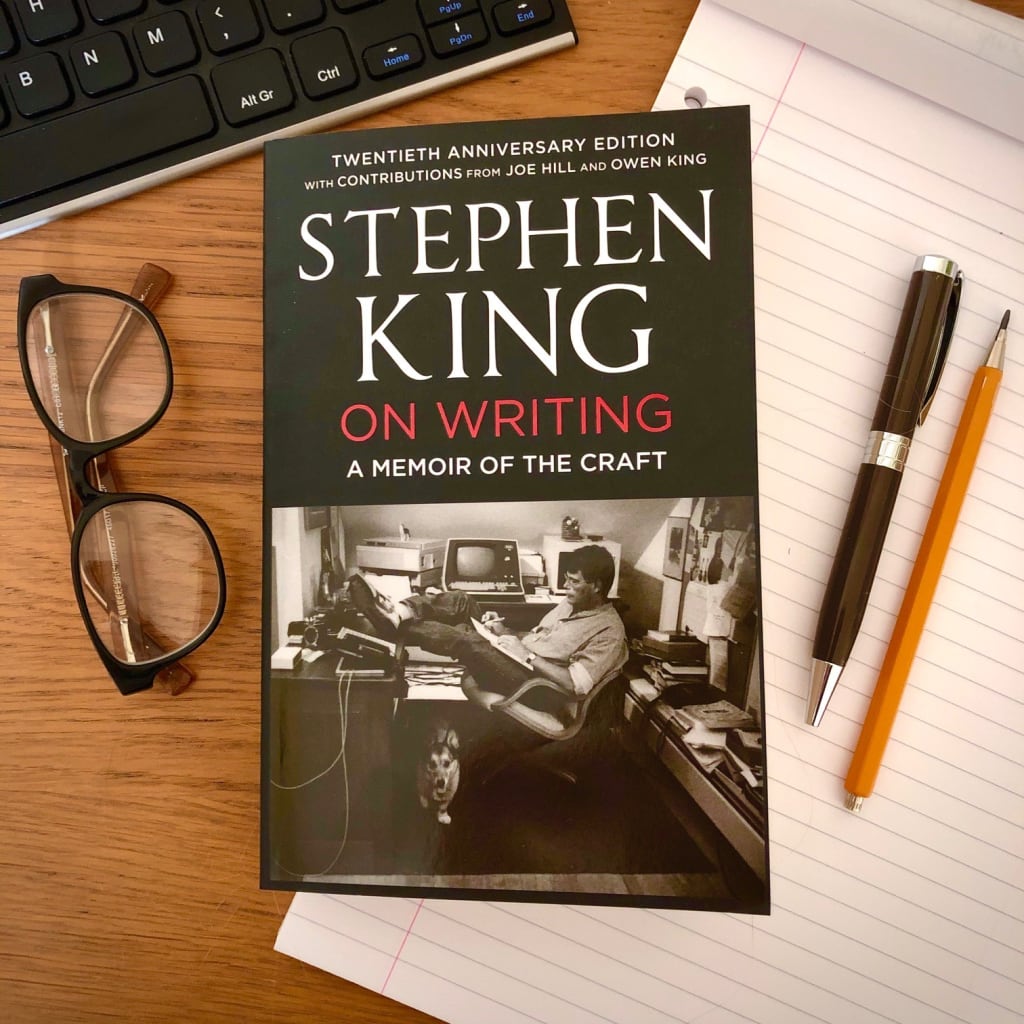Dear Writer: You Must Read Stephen King’s Memoir
What lessons I learned from reading “On Writing”.

What does it take to be a good writer?
Stephen King is the master when it comes to writing. His book, On Writing, is the funniest and the most well-written book I’ve ever read. It is a biography/guide on how to become a better writer. Stephen breaks down tools, examples and secrets which will improve your writing.
I want to write like him one day.
After reading his book, I can say with confidence that my writing will improve from now on.
Here are the 5 lessons I found the most essential —
#1: Good Readers Make Good Writers
If you want to be a writer, you must do two things above all others: read a lot and write a lot.
It makes sense, doesn’t it?
Where if not from books we, writers, will learn the most.
When you are reading books, you are secretly learning. We get inspired and see lots of patterns that later on, subconsciously, we will use in our own writing. Additionally, you improve your vocabulary and develop your own style.
When it comes to the “I don’t have time to read” argument:
Can I be blunt on this subject? If you don’t have time to read, you don’t have the time (or the tools) to write. Simple as that.
#2: Don’t Worry About Grammar Or Vocabulary
Remember that the basic rule of vocabulary is: to use the first word that comes to your mind if it is appropriate and colourful.
Keep it simple.
Don’t confuse yourself and others.
One mistake I did at the start of my writing journey was the overuse of “smart” words. I believed that using a broad vocabulary with difficult grammar would make my articles “more professional”, which is bullshit.
The most important part of writing, especially on Medium, is delivering a clear and simple message to the reader.
Everyone should understand what you mean.
#3: Create a Good Writing Environment
Eliminate every possible distraction.
If I knew this from the start…
You should get inspired by your environment.
The creation should be born in a place where you feel comfortable.
- Work in a clean space.
- Organize your desk, and decorate everything as you want.
- Write in total silence, you should be fully concentrated.
- Avoid distractions, and leave your phone in the other room.
By applying all these tips you will be present, in the flow.
#4: Don’t Be Afraid, Be Yourself
I’m convinced that fear is at the root of most bad writing.
Develop your own style.
When readers come to your articles, they should feel like coming to your home, not an IKEA store where everything is generic. Write as you would write for yourself. It is the best way to make your reader understand what you mean.
This will differentiate you from other writers, making you “special”.
This will create a relationship between you and your readers, you are being yourself.
Your audience will trust you and the bond will become stronger.
#5: Consistency, Keep Writing
Work as hard as you possibly can on at least one thing and see what happens.
This rule should be applied to everything.
The only way of becoming a better writer is by writing. You should always work on the art. Writing 1 or 2 articles a week won’t cut it. Only through lots of practice, you will start to get the hang of it. By creating a portfolio of your articles you will be able to look back and improve.
It took me 30 articles to reach 1000 views.
With time and consistency, everything will come. Be patient.
It is one of the funniest and well-written books I’ve ever read, you will love it!
Subscribe to my monthly newsletter! This month, I will record a video sharing my opinion on the books I’ve read and my reading list for the next month.
Thanks for reading :)
P.S Do you think I should write more about “Writing”?
About the Creator
Ionutz Kazaku
Writing articles, reading books, listening to podcasts — constantly learning.
All my socials: bio.link/ionutzkazaku
Reader insights
Outstanding
Excellent work. Looking forward to reading more!
Top insights
Compelling and original writing
Creative use of language & vocab
Easy to read and follow
Well-structured & engaging content
Excellent storytelling
Original narrative & well developed characters
Expert insights and opinions
Arguments were carefully researched and presented
Eye opening
Niche topic & fresh perspectives
Heartfelt and relatable
The story invoked strong personal emotions
Masterful proofreading
Zero grammar & spelling mistakes
On-point and relevant
Writing reflected the title & theme







Comments (10)
Keep up the excellent work. Thank you.
I agree. It is required reading for a creative writing course I took. Loved it!
I will definitely hunt down this book. I'm a huge fan of Stephen King, I love writing and the added bonus of humour has me sold. THanks.
As a writer myself who always overthinks & tries to make everything perfect, I am glad one of my favorite writers have given these useful tips for us to use.
I appreciate the time it took to present us with a short list. That makes it a perfect way to "get into" the rest! Now I really, really want to read this book! Thanks. I'm now a subscriber.
Oh man, I love this book. I haven’t read any of his other works (not much of a horror person) but this book is solid
Excuse my ignorance but I didn't realize this book existed; from Stephen King no less! This article is the reason I'm going to get a copy, thank you 😊
Thanks for the tip on this book. I have already been introduced to some of Stephen Kings tips but I think the purchase of the entire works is now necessary. Well time to get reading and yes please keep writing.
There's probably not a book I've read more often than ON WRITING, as I've had the Audible version on every device I've owned since the day the book dropped and have listened to it, conservatively, fifty times over two decades. But I think I return to it so often less for the writing advice and more for the memoir, as times have changed drastically since 2000 and so much of King's advice hasn't aged very well. I would disagree with your header for point #2, as King in no way suggests you shouldn't worry about *grammar*; quite the opposite, he clearly states that a firm and correct grasp of grammar should be "on the top shelf of your toolbox". He just doesn't turn ON WRITING into a grammar textbook because if you don't come to the writing desk fully-loaded with an understanding of proper grammar, you can't hope to write a coherent story. Truly the most liberating idea in the book is his concept of unearthing stories as found relics, freeing us from the never-ending plot outlines and reams of story development notes. I did that exact thing -- just put my characters in a situation and let them run with it -- for my New Worlds Challenge chapter, such fun to just dive in and write, see what the characters end up telling you about the story.
I have a slightly different take. https://vocal.media/fiction/challenging-the-king-on-writing